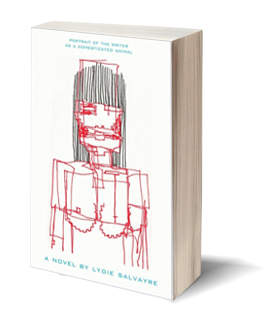Portrait of the Writer as a Domesticated AnimalBy Lydie Salvayre
|
 |
|---|
Reviewed by Diane Leach
Lydie Salvayre's Portrait of the Writer as a Domesticated Animal opens with said domesticated writer on a metaphorical leash: Impoverished despite having penned a few successful novels, the unnamed narrator has agreed to ghostwrite the autobiography of the world’s richest businessman, known as Tobold the Hamburger King.
True to his name, Tobold owns a worldwide burger and fries franchise. He is an outsized, egotistical monster, fond of comparing himself to Christ. When not pillaging the financial landscape, he laps up beer, cocaine, and women, only to return to his 146-room mansion in the wee hours, where his devoted wife, Cindy, awaits him. It is Cindy, and later, the narrator, who soothe Tobold during his insomniac night terrors, wherein his villainy and those who suffer from it haunt him.
Salvayre creates a gross caricature of the financial world and what happens when an artist caves in to money’s alluring creature comforts: the narrator exhaustively details the millions Tobold acquires and hoards (altruism not being his strong suit), his 365 cars, his mansion, his hobnobbing with “Bob” DeNiro and Sharon Stone. Published in France in 2007, Portrait is chillingly prescient: American readers will perhaps make comparisons to Bernard Madoff, another financier who felt himself above the law to the point of hubris.
Even more alarming than the horrible Tobold is the narrator, who accepts this plum assignment with guilt, for Tobold represents everything she loathes: Rampant capitalism, greed, disdain for fellow man, a complete disinterest in literature. Yet the longer she stays with him—as part of her writing assignment, Tobold demands her constant presence, moving her into the mansion so she can jot every prophetic utterance—the more she cultivates a taste for luxury. She adores the delicious foods, the designer wardrobe, the fresh croissants servants proffer as she lolls in bed. She is appalled at herself, but keeps quiet, “just like everyone else who depends on someone else to earn a living, and who worries that if they rebel, they’ll lose their benefits, however miniscule those might be.”
Though the writing is trenchant, piercing, and excellently translated, the book is hard going. As the plot moves between the odious, crotch-grabbing Tobold and the narrator’s increasing psychological decompensation, the despair is engulfing. The writer repeatedly vows to speak up, to let Tobold know how much his theories disgust her, yet her own timidity, cowardice, and avarice silence her. Her fear of conflict is nearly pathological; raised in a poor household by an abusive father, she crumbles at a raised voice. She says, “I knew nothing but how to keep quiet and I had suffered greatly for it my entire life.”
Her time with Tobold will be no exception.
Interestingly, Tobold comes from a similarly undereducated, impoverished background, but finds salvation in cash, not literature. Both he and his “little darling” of a writer have worked hard to overcome their childhoods, honing their speech, their manners (in Tobold’s case, intermittently), their chosen careers. Ironically, their vastly different choices still bring them together before the almighty dollar. And though their responses differ, both suffer.
The longer the narrator shadows Tobold, the more she disintegrates. Eventually, she can no longer bear to write Tobold's expositions upon the abolition of unemployment benefits, aid to the disabled, and help for the poor. Tobold’s sense of grandeur only grows. The Bible, he claims, is worthless. The Free Market rules. Therefore, blessed by the Pope, he will include scripture on his burger franchise cups. He will sell his junk food to children, whose innocence makes them perfect targets. He will buy competing chains and distill their menus to burgers and fries on paper plates, marketed to “the country most open to obesity: the United States of America.” All along, the narrator rails at Tobold in her head, longing to spit her revulsion out. Only the money keeps coming. The money, and also the exquisite restaurants, the posh nightclubs, the travel.
Lacking independent incomes or wealthy ancestors, most of us are forced to seek employment of some kind. While a few have the good fortune to pursue work they truly love, the vast majority must compromise, accepting employment that keeps us housed and fed. If we are lucky, our work neither clashes with core values nor harms others. Yet Salvayre’s book appears at a time when many Americans, desperate for income, must ignore such qualms. Still, it is possible to read Portrait with a dangerous complacency. You would never fall prey to the petty lures of fine wines, pretty dresses, and wads of cash from a Tobold. No, not you. You’d rather scrub floors or work at McDonald’s. Perhaps that’s even true, but what’s also true is that few of us will ever be so tested, making Salvayre’s book more than a tale of selling out. Portrait of the Writer as a Domesticated Animal is a dire warning, a reminder to those of us who, with the best intentions, might confuse want with need, at a terrible cost.
